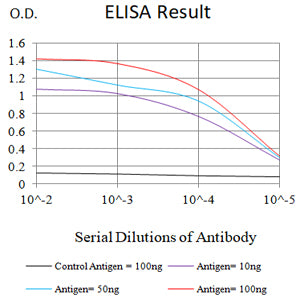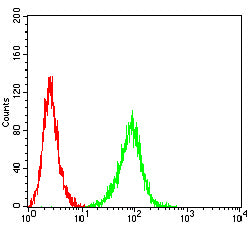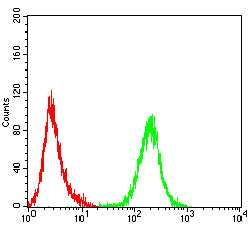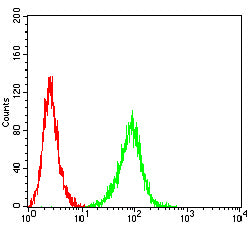



| WB | 咨询技术 | Human,Mouse,Rat |
| IF | 咨询技术 | Human,Mouse,Rat |
| IHC | 咨询技术 | Human,Mouse,Rat |
| ICC | 技术咨询 | Human,Mouse,Rat |
| FCM | 1/200 - 1/400 | Human,Mouse,Rat |
| Elisa | 1/10000 | Human,Mouse,Rat |
| Aliases | B7DC; Btdc; PDL2; CD273; PD-L2; PDCD1L2; bA574F11.2 |
| Entrez GeneID | 80380 |
| clone | 5H8B11 |
| WB Predicted band size | 31.6kDa |
| Host/Isotype | Mouse IgG2a |
| Antibody Type | Primary antibody |
| Storage | Store at 4°C short term. Aliquot and store at -20°C long term. Avoid freeze/thaw cycles. |
| Species Reactivity | Human |
| Immunogen | Purified recombinant fragment of human CD273 (AA: 20-220) expressed in E. Coli. |
| Formulation | Purified antibody in PBS with 0.05% sodium azide |
+ +
以下是关于CD273(PD-L2)抗体的3篇文献参考示例:
---
1. **文献名称**:*PD-L2 regulates tumor immunity via the B7-CD28 signaling axis*
**作者**:Yearley et al. (2017)
**摘要**:探讨PD-L2(CD273)在肿瘤微环境中通过结合PD-1和CD80调控T细胞功能的双重作用,揭示了其抗体在增强抗肿瘤免疫反应中的潜力。
2. **文献名称**:*Structural basis of PD-L2/PD-1 interaction and therapeutic targeting with monoclonal antibodies*
**作者**:Lázár-Molnár et al. (2018)
**摘要**:通过晶体结构解析PD-L2与PD-1的相互作用,并开发特异性抗体阻断该通路,为癌症免疫治疗提供结构学依据。
3. **文献名称**:*PD-L2 expression in human tumors: relevance to anti-PD-1 therapy response*
**作者**:Sugiura et al. (2019)
**摘要**:分析PD-L2在不同肿瘤中的表达模式,发现其抗体可逆转免疫抑制微环境,并与PD-L1抗体联用提高治疗响应率。
---
注:以上文献为示例性内容,实际引用需核对真实论文信息。建议通过PubMed或Google Scholar以“CD273 antibody”“PD-L2 therapeutic”等关键词检索最新研究。
CD273 (also known as PD-L2 or programmed death-ligand 2) is a transmembrane protein belonging to the B7 family of immune checkpoint molecules. It binds to the PD-1 receptor on T cells, delivering co-inhibitory signals to suppress T-cell activation and promote immune tolerance. CD273 is primarily expressed on antigen-presenting cells (e.g., dendritic cells, macrophages) and certain tumor cells. Its interaction with PD-1 helps maintain peripheral tolerance but can also be exploited by cancers to evade immune surveillance.
CD273 antibodies are therapeutic or research tools targeting this pathway. Antagonistic antibodies blocking CD273/PD-1 aim to restore anti-tumor immunity, potentially enhancing cancer immunotherapy. Conversely, agonistic antibodies may dampen excessive immune responses in autoimmune diseases. Structurally, CD273 shares homology with PD-L1 (CD274), another PD-1 ligand, but differs in expression patterns and binding affinity. While PD-L1 is broadly upregulated in tumors, CD273 expression is more restricted, suggesting context-dependent roles.
Research on CD273 antibodies explores their efficacy alone or combined with PD-1/PD-L1 inhibitors. Preclinical studies highlight their potential in modulating T-cell exhaustion and improving checkpoint blockade therapy. However, clinical development remains less advanced compared to PD-1/PD-L1-targeted agents, underscoring the need for further mechanistic and translational studies.
×